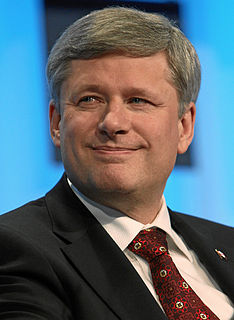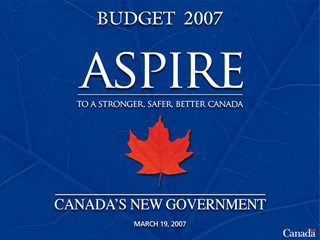
Stephen Joseph Harper is a Canadian politician who served as the 22nd prime minister of Canada from 2006 to 2015. Harper won three mandates during his nearly decade-long tenure, and is the first and only prime minister to come from the modern-day Conservative Party of Canada, serving as the party's first leader from 2004 to 2015.

James Michael Flaherty was a Canadian politician who served as the federal minister of finance from 2006 to 2014. First elected to the Legislative Assembly of Ontario in 1995 under the Progressive Conservative (PC) banner, Flaherty would sit as a member of Provincial Parliament (MPP) until 2006, also serving in a number of Cabinet positions from 1997 to 2002 during Premier Mike Harris' government. He unsuccessfully ran for the PC leadership twice, before deciding to enter federal politics and running for the Conservative Party of Canada in the 2006 election. With his party forming government, Prime Minister Stephen Harper named Flaherty as the new finance minister, a position he would hold until his resignation in 2014. During his tenure, Flaherty tabled nine federal budgets and shaped Canadian fiscal policy through the 2008 financial crisis. He was the longest continuously serving minister in Harper's government until his resignation. Flaherty died of a heart attack three weeks after his resignation as minister. His widow, Christine Elliott, is currently the deputy premier of Ontario.

Kathleen O'Day Wynne is a Canadian politician who served as the 25th premier of Ontario and leader of the Ontario Liberal Party from 2013 to 2018. She has served the member of provincial parliament (MPP) for the Toronto riding of Don Valley West since October 3, 2003. She is the first female premier of Ontario and the first openly gay premier in Canada.
Dean A. Del Mastro is a former Canadian politician. He represented Peterborough in the House of Commons of Canada as a member of the Conservative Party from January 23, 2006 until November 5, 2014. He resigned from parliament after being convicted of breaking the Elections Canada Act during the 2008 election. He had previously served as the parliamentary secretary to the Prime Minister of Canada and the Minister of Intergovernmental Affairs.

The Canadian federal budget for the fiscal year 2006–2007, was presented to the House of Commons of Canada by Finance Minister Jim Flaherty on May 2, 2006. Among the most notable elements of the federal budget were its reduction of the Goods and Services Tax by one percentage point, income tax cuts for middle-income earners, and $1,200-per-child childcare payment for Canadian parents.

The Canadian federal budget for the 2007–2008 fiscal year was presented to the House of Commons of Canada by Finance Minister Jim Flaherty. Flaherty presented the 2007 budget on March 19, 2007. No income tax or GST cuts were announced but there were tax credits for some families with children under 18. The federal budget included $14 billion in new spending and $5.7 billion in tax cuts. This was the second budget of the 39th Canadian Parliament.
Since its election to power on January 23, 2006, the Conservative Party of Canada led by Prime Minister Stephen Harper adopted several positions and policies in regard to the economic issues of Canada, including various tax cuts, exemptions and credits as well as discussing the issue of fiscal imbalance among provinces and measures to cope with more troubled sectors of the Canadian economy.

The 40th Canadian Parliament was in session from November 18, 2008 to March 26, 2011. It was the last Parliament of the longest-running minority government in Canadian history that began with the previous Parliament. The membership of its House of Commons was determined by the results of the 2008 federal election held on October 14, 2008. Its first session was then prorogued by the Governor General on December 4, 2008, at the request of Prime Minister Stephen Harper, who was facing a likely no-confidence motion and a coalition agreement between the Liberal party and the New Democratic Party with the support of the Bloc Québécois. Of the 308 MPs elected at the October 14, 2008 general election, 64 were new to Parliament and three sat in Parliaments previous to the 39th: John Duncan, Jack Harris and Roger Pomerleau.

The 2011 Canadian federal election was held on May 2, 2011, to elect members to the House of Commons of Canada of the 41st Canadian Parliament.

The 2008–2009 Canadian parliamentary dispute was a political dispute during the 40th Canadian Parliament. It was triggered by the expressed intention of the opposition parties to defeat the Conservative minority government on a motion of non-confidence six weeks after the federal election of October 14, 2008.
Kevin Page is a Canadian economist. He was the first ever Parliamentary Budget Officer for Canada. He was appointed to the position on March 25, 2008, and his term was completed on March 22, 2013. He now teaches at the University of Ottawa. In 2013, Page was named as the Jean-Luc Pepin Research Chair on Canadian Government. In 2016, Page became the head of the newly created Institute of Fiscal Studies and Democracy (IFSD), a think tank with a focus on public finance and policy at the University of Ottawa.
The Canadian federal budget for the 2009-2010 fiscal year was presented to the House of Commons of Canada by Finance Minister Jim Flaherty on January 27, 2009. The federal budget included $40 billion in stimulus and $20 billion in personal income tax cuts.

The Office of the Parliamentary Budget Officer is an office of the Parliament of Canada which provides independent, authoritative and non-partisan financial and economic analysis. The office is led by the Parliamentary Budget Officer, an independent officer who supports parliamentarians in carrying out their constitutional roles of scrutinizing the raising and spending of public monies and generally overseeing the government's activities.
In Canada, the federal government makes equalization payments to provincial governments to help address fiscal disparities among Canadian provinces based on estimates of provinces' fiscal capacity—their ability to generate tax revenues. A province that does not receive equalization payments is often referred to as a "have province", while one that does is called a "have not province". In 2020–21, five provinces will receive $20.573 billion in equalization payments from the federal government. In 2021–22, provinces and territories will receive $83.9 billion through major transfers.
Prorogation is the end of a parliamentary session in the Parliament of Canada and the parliaments of its provinces and territories. It differs from a recess or adjournment, which do not end a session, and from a complete dissolution of parliament, which ends both the session and the entire parliament, requiring an election for the House of Commons in the bicameral federal parliament and the singular legislative chamber of the unicameral provincial parliaments.

The Canadian federal budget for the 2008-2009 fiscal year was presented to the House of Commons of Canada by Finance Minister Jim Flaherty on February 26, 2008.
The Canadian federal budget for fiscal year 2012–13 was presented to the House of Commons of Canada by Finance Minister Jim Flaherty on 29 March 2012. Among the most notable elements of the federal budget were changes to Old Age Security and a reduction of the budget for the Canadian Forces and the Canadian Broadcasting Corporation.
The Canadian federal budget for fiscal year 2013–2014 was presented to the House of Commons of Canada by Finance Minister Jim Flaherty on 21 March 2013. The budget bill was tabled in the legislature on 29 April 2013 as the Economic Action Plan 2013 Act, No. 1. A second budget bill will be tabled in the autumn, which will include elements excluded from the first bill, such as the Canada Job Grant. The deficit was projected to be $18.7 billion for the fiscal year 2013-2014, however this was adjusted to $8.1 billion by end of the fiscal year and once the Auditor General's recommendations on the Government's unfunded pension obligations were taken into account.
The Canadian federal budget for fiscal year 2014–2015 was presented to the House of Commons of Canada by Jim Flaherty on 11 February 2014. This was the last budget presented by the Finance Minister before his resignation in March and death in April. At the end of the fiscal year, the government was surprised to post a budgetary surplus of $1.9 billion. This however would later be overturned to a small deficit of $550 million due to improper accounting methodologies for the Government's unfunded pension obligations, as pointed out for years by the Auditor General.
The Canadian federal budget for fiscal year 2018–2019 was presented to the Canadian House of Commons by Finance Minister Bill Morneau on February 27, 2018 as the omnibus Budget Implementation Act, 2018, No. 1. The deficit was projected to be $18.1 billion, including a $3 billion adjustment for risk. This was later refined to $14.0 billion when the Annual Financial Report of the Government of Canada for Fiscal Year 2018–2019 was released.









